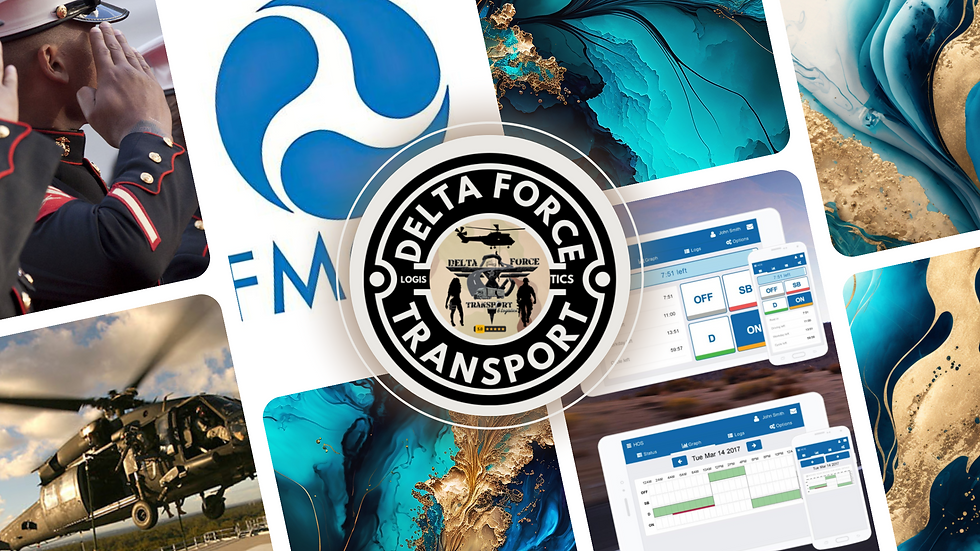What Is ELD? Why truckers use it
- Dec 12, 2025
- 4 min read
Updated: Jan 31
In 2025, the FMCSA plans to introduce revisions to the ELD regulations. These updates are expected to address emerging technologies, enhance the accuracy of driver logs, and improve overall safety. The revisions may include new requirements for data sharing, expanded compliance measures for certain vehicles, and possibly adjustments to the exceptions and exemptions currently in place. These changes are being made to ensure the continued effectiveness of the ELD mandate in promoting road safety, while also adapting to advancements in technology and the evolving needs of the trucking industry.
What is the ELD Mandate?
The FMCSA’s ELD mandate was implemented in 2017 to enhance working conditions for commercial drivers and improve road safety for the public. Beginning in December 2017, vehicles that fall under ELD regulations were required to record and report their Hours of Service (HOS) using electronic logging devices (ELDs) and a digital logbook, replacing the previous paper logbooks. The HOS data is collected directly from the vehicle’s engine and automatically transmitted to the virtual logbook.


Most drivers who operate a commercial motor vehicle (CMV) for hire, transporting goods or passengers across state lines, must comply with the ELD mandate. According to the FMCSA, vehicles weighing over 10,000 pounds or with a gross vehicle weight rating (GVWR) or gross combination weight rating (GCWR) exceeding 10,000 pounds must be equipped with an electronic logging device (ELD). ELD compliance also applies to vehicles used to transport nine or more passengers (including the driver) for hire, or those designed to carry 16 or more non-paying passengers (including the driver). Additionally, any vehicle hauling hazardous materials that require warning signs must meet ELD standards.
There are some exceptions to the ELD requirements. Drivers who use paper logs instead of an electronic logbook for no more than eight days within a 30-day period are exempt, though they may still be subject to the 16-hour rule. Driveaway or towaway drivers are also exempt if the vehicle being transported is either a commodity or a motorhome or recreational vehicle. However, for the exemption to apply, at least one set of wheels on the transported vehicle must remain on the transport vehicle’s surface. Additionally, vehicles manufactured before the year 2000 are not required to have ELDs.
Some agencies have also been granted exemptions by the Department of Transportation, including the Truck Leasing and Renting Association, the Motion Picture Association, and United Parcel Service (UPS). While these organizations are exempt from the ELD mandate, they may still equip their vehicles with electronic logbooks for drivers at their discretion.
Samsara – Best overall ELDs: Offers comprehensive features and easy integration.
Matrack ELD – Best-priced ELD compliance: Affordable solution for ELD compliance.
GPS Insight – Best for customer support: Known for excellent customer service.
Gorilla Safety ELD – Best for document management: Specializes in managing documents easily.
BigRoad’s Dashlink ELD – Best for seasonal fleets: Ideal for fleets with fluctuating operations.
EROAD Ehubo ELD – Best for ease of use: User-friendly interface and simple operation.
Motive ELD (formerly KeepTruckin) – Best for advanced fleets: Great for larger fleets with advanced needs.
GPS Trackit ELD – Best for simple maintenance: Excellent for fleets needing straightforward maintenance tracking.
Azuga eLogs – Best for quick adaptation: Great for fleets looking to quickly adopt ELD compliance.
Verizon Connect ELD – Best for add-ons and extras: Offers extensive additional features and integrations.
Lytx with Geotab GO Cloud ELD – Best for data security: Focuses on high-level data protection and security.
Teletrac Navman ELD – Best for fleet manager support: Excellent support for fleet management and optimization.
Each of these ELDs offers unique benefits depending on the specific needs of the fleet or operator.
When Is an ELD Required for Trucks?
Since December 18, 2017, U.S. federal regulations have required most commercial motor vehicle operators to use Electronic Logging Devices (ELDs) to ensure compliance with hours-of-service rules.
Who Must Use an ELD?ELD compliance is mandatory for commercial drivers who are required to maintain Records of Duty Status (RODS), including those operating:
Vehicles weighing over 10,001 pounds
Vehicles transporting placarded hazardous materials
Vehicles designed to carry more than 8 passengers (for compensation) or more than 15 passengers (not for compensation)
Interstate commercial drivers required to keep RODS
Who Is Exempt from ELD Requirements?According to the FMCSA, the following are exempt from using ELDs:
Vehicles with engines manufactured before 2000 (regardless of VIN)
Tow-away drivers (where the vehicle being driven is the commodity)
Drivers not required to maintain RODS
Drivers who use paper RODS for 8 or fewer days within any 30-day period
Drivers transporting insects or livestock (currently exempted by FMCSA)





Comments